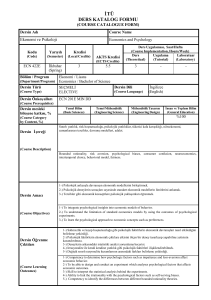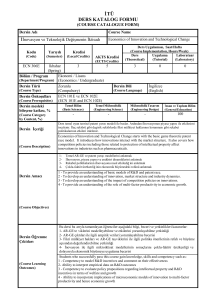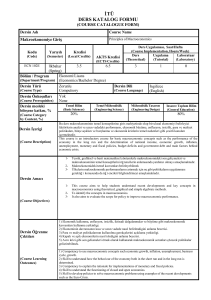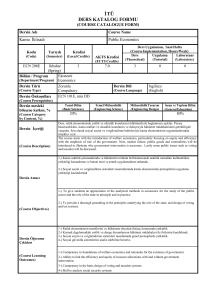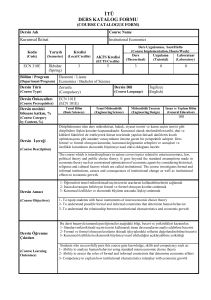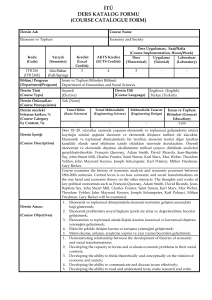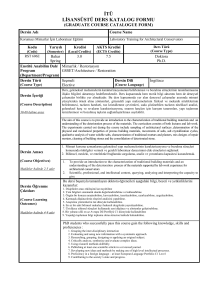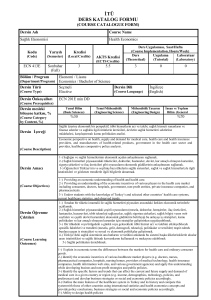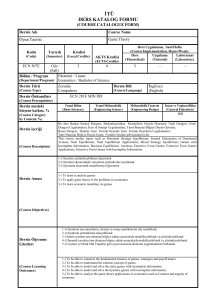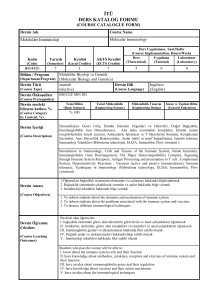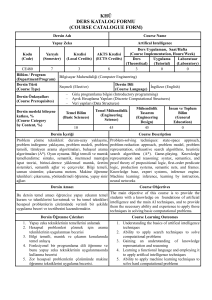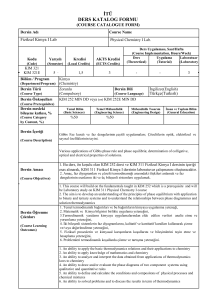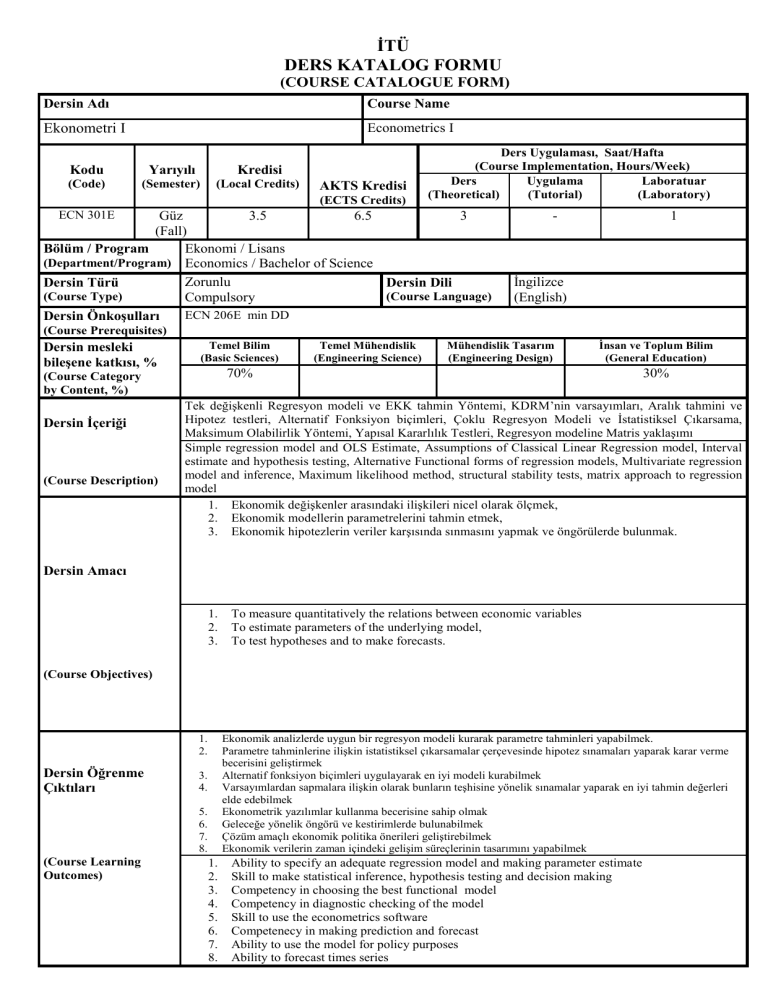
İTÜ
DERS KATALOG FORMU
(COURSE CATALOGUE FORM)
Dersin Adı
Course Name
Ekonometri I
Econometrics I
Kodu
Yarıyılı
Kredisi
(Code)
(Semester)
(Local Credits)
AKTS Kredisi
(ECTS Credits)
Ders Uygulaması, Saat/Hafta
(Course Implementation, Hours/Week)
Ders
Uygulama
Laboratuar
(Theoretical)
(Tutorial)
(Laboratory)
Güz
3.5
6.5
3
(Fall)
Ekonomi / Lisans
Bölüm / Program
(Department/Program) Economics / Bachelor of Science
Zorunlu
Dersin Türü
Dersin Dili
(Course Type)
(Course Language)
Compulsory
ECN 206E min DD
Dersin Önkoşulları
ECN 301E
-
1
İngilizce
(English)
(Course Prerequisites)
Dersin mesleki
bileşene katkısı, %
Temel Bilim
(Basic Sciences)
(Course Description)
Mühendislik Tasarım
(Engineering Design)
İnsan ve Toplum Bilim
(General Education)
70%
(Course Category
by Content, %)
Dersin İçeriği
Temel Mühendislik
(Engineering Science)
30%
Tek değişkenli Regresyon modeli ve EKK tahmin Yöntemi, KDRM’nin varsayımları, Aralık tahmini ve
Hipotez testleri, Alternatif Fonksiyon biçimleri, Çoklu Regresyon Modeli ve İstatistiksel Çıkarsama,
Maksimum Olabilirlik Yöntemi, Yapısal Kararlılık Testleri, Regresyon modeline Matris yaklaşımı
Simple regression model and OLS Estimate, Assumptions of Classical Linear Regression model, Interval
estimate and hypothesis testing, Alternative Functional forms of regression models, Multivariate regression
model and inference, Maximum likelihood method, structural stability tests, matrix approach to regression
model
1. Ekonomik değişkenler arasındaki ilişkileri nicel olarak ölçmek,
2. Ekonomik modellerin parametrelerini tahmin etmek,
3. Ekonomik hipotezlerin veriler karşısında sınmasını yapmak ve öngörülerde bulunmak.
Dersin Amacı
1.
2.
3.
To measure quantitatively the relations between economic variables
To estimate parameters of the underlying model,
To test hypotheses and to make forecasts.
(Course Objectives)
1.
2.
Dersin Öğrenme
Çıktıları
Ekonomik analizlerde uygun bir regresyon modeli kurarak parametre tahminleri yapabilmek.
Parametre tahminlerine ilişkin istatistiksel çıkarsamalar çerçevesinde hipotez sınamaları yaparak karar verme
becerisini geliştirmek
Alternatif fonksiyon biçimleri uygulayarak en iyi modeli kurabilmek
Varsayımlardan sapmalara ilişkin olarak bunların teşhisine yönelik sınamalar yaparak en iyi tahmin değerleri
elde edebilmek
Ekonometrik yazılımlar kullanma becerisine sahip olmak
Geleceğe yönelik öngörü ve kestirimlerde bulunabilmek
Çözüm amaçlı ekonomik politika önerileri geliştirebilmek
Ekonomik verilerin zaman içindeki gelişim süreçlerinin tasarımını yapabilmek
3.
4.
5.
6.
7.
8.
(Course Learning
Outcomes)
1.
2.
3.
4.
5.
6.
7.
8.
Ability to specify an adequate regression model and making parameter estimate
Skill to make statistical inference, hypothesis testing and decision making
Competency in choosing the best functional model
Competency in diagnostic checking of the model
Skill to use the econometrics software
Competenecy in making prediction and forecast
Ability to use the model for policy purposes
Ability to forecast times series
Ders Kitabı
(Textbook)
Introductory Econometrics,A Modern Approach Wooldridge J 5th edition South
western, 2013
Diğer Kaynaklar
Basic Econometrics, Gujarati D. And Porter D. 5th edition, 2008
(Other References)
Laboratuar Uygulamaları
Öğrencilerin, derste öğretilen yöntemleri uygulayacakları bir proje çalışması
yapmaları gerekmektedir.
Students are required to prepare a project work using the methods that are taught in
the class.
-
(Laboratory Work)
-
Bilgisayar Kullanımı
EVIEWS, STATA, R
(Computer Use)
EVIEWS, STATA, R
Diğer Uygulamalar
-
(Other Activities)
-
Başarı Değerlendirme
Sistemi
Faaliyetler
(Activities)
Yıl İçi Sınavları
(Midterm Exams)
Kısa Sınavlar
(Quizzes)
Ödevler
(Homework)
Projeler
(Projects)
Dönem Ödevi/Projesi
(Term Paper/Project)
Laboratuar Uygulaması
(Laboratory Work)
Diğer Uygulamalar
(Other Activities)
Final Sınavı
(Final Exam)
Ödevler ve Projeler
(Homework & Projects
(Assessment Criteria)
Adedi
(Quantity)
1
Değerlendirmedeki Katkısı, %
(Effects on Grading, %)
%25
5
%10
12
%5
-
1
%60
DERS PLANI
Hafta
1
2
3
4
5
6
7
8
9
10
11
12
13
14
Konular
Tek değişkenli Regresyon modeli
EKK tahmin Yöntemi
KDRM’nin varsayımları
Aralık tahmini
Küçük örneklem Hipotez testleri
Büyük örneklem hipotez testleri
Alternatif Fonksiyon biçimleri
Orijinden Geçen Regresyon
Ölçekleme ve ölçü birimi
Çoklu Regresyon Modeli
İstatistiksel çıkarım
Maksimum Olabilirlik Yöntemi
Yapısal Kararlılık Testleri
Regresyon modeline matris yaklaşımı
Dersin
Çıktıları
1
1
1
1,2
2
2
3,5
1,4
5
5
6
6
7
8
COURSE PLAN
Weeks
1
2
3
4
5
6
7
8
9
10
11
12
13
14
Topics
Simple regression model
OLS estimation method
Assumptions of CLRM
Interval estimate
Hypothesis testing in small sample
Hypothesis testing in large sample
Alternative functional forms of regression models
Regression through the origin
Scaling and units of measurement
Multivariate regression model
Statistical inference
Maximum Likelihood Method
Structural stability test
Matrix approach to regression model
Course
Outcomes
1
1
1
1,2
2
2
3,5
1,4
5
5
6
6
7
8
Dersin Ekonomi Lisans Programıyla İlişkisi
Katkı
Seviyesi
1 2 3
X
Programın mezuna kazandıracağı bilgi ve beceriler (programa ait çıktılar)
i.
ii.
iii.
iv.
v.
vi.
vii.
viii.
Ekonomik ve sosyal problemleri, temsili aktörlerin amaç fonksiyonlarını bir takım kısıtlara tabi
olarak maksimize ettikleri ve buna bağlı olarak çeşitli tarz dengelerin oluştuğu ortamlar şeklinde
matematiksel olarak modelleyen iktisadi yaklaşımda yetkinlik.
Mikroiktisadi fiyat sistemini özel ve kamu malları ve uluslar arası ticaret bağlamında öğrenip iş
stratejileri ve kamu politikaları tasarımında etkinlik ve eşitlik dengesini gözeterek hukuk
çerçevesinde kullanabilme yetkinliği. Bulguları Türkçe veya İngilizce olarak ifade edebilmek.
Fiyatların genel düzeyi, işsizlik ve çıktı düzeyine ilişkin temel makroekonomik modelleri inşa
edebilme kabiliyeti. Bulguları Türkçe veya İngilizce olarak ifade edebilme becerisi.
Ekonomik büyüme ve teknolojik gelişmenin belirleyenlerini, sosyal fayda ve sosyal maliyetlerini
değerlendirebilme kabiliyeti.
X
X
X
İstatistiki ve ekonometrik modelleme ve yöntemleri iktisadi ve sosyal verilerin bilgisayar
ortamında analiz edilmesinde ve yorumlanmasında temel düzeyde kullanabilme yetkinliği.
Bulguları Türkçe veya İngilizce olarak ifade edebilme becerisi.
Bir sektörün ekonomisinde uzmanlık geliştirme kabiliyeti. Yerli veya yabancı bir ülkedeki bir
sektörde uzmanlık.
Karar verme alanındaki standart iktisadi modellerde ve karar vermeye ilişkin alternatif
varsayımlarda yetkinlik.
Yurt içinde veya dışındaki ekonomik kurumlar ve düzenlemeleri, tarihi, hukuki ve sosyal
altyapıyı dikkate alarak analiz etme yetkinliği. Bu tür bir analizi sektörel uzmanlıkla birleştirme
becerisi.
X
X
X
X
1: Az, 2. Kısmi, 3. Tam
Relationship between the Course and Economics Curriculum
The Knowledge, Skills and Competencies that Students will Gain from the Program
(Program Outputs)
i.
ii.
iii.
iv.
v.
vi.
vii.
viii.
Competency in the fundamental economic approach that models economic and social problems
mathematically as environments with various types of equilibria where representative agents
maximize their objective functions subject to a set of constraints.
Competency in the microeconomic price system in the context of private and public goods and
international trade, and the ability to design business strategies and public policies considering
efficiency-equity balance and the legal framework. Skill to express findings in Turkish or
English.
Ability to construct basic macroeconomic models regarding the general price level,
unemployment, and output. Skill to express findings in Turkish or English.
Ability to assess the social benefits, costs, and determinants of economic growth and
technological advancement.
Competency in statistical and econometric modeling and methods to analyze and interpret at a
basic level economic and social data in a computerized environment. Skill to express findings
in Turkish or English.
Ability to develop expertise in the economics of a sector. Specialty in a domestic or foreign
sector.
Competency in economic models of decision making and in alternative assumptions related to
decision-making.
Competency to analyze domestic or foreign economic institutions and regulations considering
the historical, legal, and social infrastructure. The skill to combine such an analysis with
sectoral expertise.
Level of
Contribution
1
2
3
X
X
X
X
X
X
X
X
1: Little, 2. Partial, 3. Full
Düzenleyen (Prepared by)
Tarih (Date)
17/06/2014
İmza (Signature)

